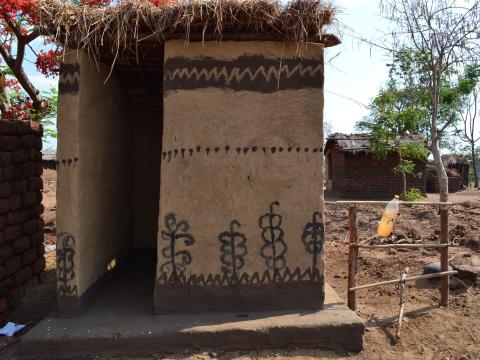Village achieves ODF through Shell-book Approach

By Janet Mbwadzulu, World Vision Malawi-WASH Communications Officer
“Change happens! But this change brings happiness only if it is for the better”. This is what community members in Kalimbuka Village, Sub Tradition Nkapita in Chingle Area Development Programme (ADP) in Zomba district are saying after becoming an open defecation free (ODF) community pending certification in November, 2013, on World Toilet Day.
This follows a sanitation and hygiene campaign which World Vision Malawi (WVM) through its Water, Sanitation and Hygiene (WASH) Programme conducted in the community in June, 2013 using a shell-book approach.
According to one of the community members, Eneless Kudzala, everybody in the community is now proud of the clean households they have where even children have learnt use the latrine when they want to relieve themselves.
“Even passers here ask for a latrine because they can see it at any household in this community, they are attracted by our cleanliness as a village, but also because they have heard about the good news in our village that we decided to stop defecating in the open,” she said.
Eneless did not forget to mention that they are finding washing hands with soap or ashes if you cannot afford soap after using the latrine easier with time than before as it is now becoming a culture. “Even children are mindful of refilling the hand-washing facility if it runs out of water and put ashes near the hand-washing facility,” she marveled.
This was evidenced by one of the children in the community, Chiyembekezo, who said his mother taught them to always wash hands after using the latrine to avoid contracting germs. “My mother told us that we should make sure that the bottle at the hand-washing facility is always filled with water for the next person who is going to visit the latrine,” he said.
One of the natural leaders who were selected to lead in construction of latrines in the community, Leonard Matemba, witnessed that there were only eight latrines in the community out of 27 households but today every household has its own.
Leonard said the main drawback to constructing latrines in the community was sliding of latrines such that people were discouraged from constructing a new latrine on a yearly basis. However, with the coming in of the campaign on sanitation and hygiene they found a solution on their own.
“We sat down as a community and found out that the main problems to the sliding of latrines were that we weren’t putting a roof over the latrines and that we were not using longer trees to cover the pit hence when the rains fall directly on the surface of the latrine, it could easily fall in,” he explained.We are cock sure that the latrines we have constructed now will survive about five to six rainy seasons and it will not be tiresome to construct a new one. In fact everybody will be encouraged to construct one lest he pays K3000 or its equivalent to the Village Headwoman as we all agreed in this community,” he continued.
Leonard said is one of the community members who gave up on constructing latrines each year but after the campaign he has not only constructed a latrine but a bathroom and a rubbish pit.
Shell-books are typically short, illustrated, story-based teaching and learning materials. They contain important content and lessons from best practice resources that are organized in a simple user-friendly format. Shell-book resource templates are designed for users to adapt them to their local context. They make it easy for even marginalized communities to create resources that communicate relevant issues and ideas.
Shell-book is a sister approach to Community Led Total Sanitation which the WVM WASH program is using in triggering communities in all its impact areas. WVM is piloting the Shell-book approach in Nogwe and Kalimbuka communities in Chingale ADP but plans are in progress to pilot the same in two more communities in Mutendere ADP in Mzimba district.